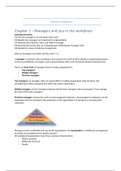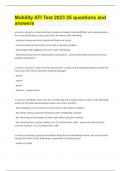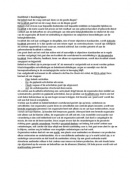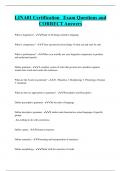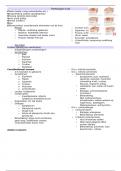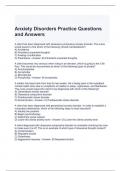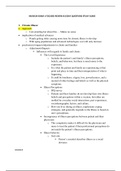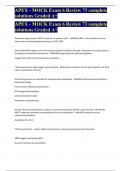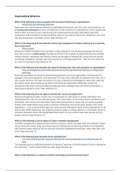CONTEMPORARY HISTORY
25 APRIL – 8 JUNE 2022
UTRECHT UNIVERSITY
COURSE CODE: GE1V21003
,WEEK 1 (25-29 April): REFORMS, REVOLUTIONS, STATE BUILDING AND
EUROPEAN SECURITY, 1800-1914
Lecture: European collective security and revolution
Lecturers: Prof. Beatrice de Graaf and Prof. Ido de Haan
In the first part of this lecture Beatrice de Graaf will explain how the Napoleonic Wars paved
the way for a new system of international relations, as well as for a transformation of politics
in Europe and beyond. The post-Napoleonic victors set out to cooperate and compete on open
waters, in newly to be established colonies, and on vanquishing ‘piracy’ and ‘revolution’. A
new system of collective security, resting on pillars of imperial and capitalist power emerged.
How effective was this Vienna Order, this Concert of Europe? How did non-European
countries, such as the United States respond to it, and did it indeed ‘bring back the world to
peaceful habits’ as British Foreign Minister Lord Palmerston had it? Or did it pave the way
for more imperial expansionism abroad and oppression and counterrevolutions at home?
The last question is the bridge to the second part of this lecture in which Ido de Haan
immerses you in the revolutionary waves of 1848. Was the transformative impact of the
revolution of 1848 comparable to that of the Atlantic revolutions between the 1770s and the
end of the Napoleonic Empire. After all the democratic ideals that underpinned the
revolutionary call for liberty soon were adopted in very different ways by the socialist and
authoritarian opponents of liberalism. While the latter was on the retreat after the heyday of
bourgeois liberalism of the 1850s, nationalism became a tool to mobilize support for
imperialist states, and socialism came to mobilize an increasing number of people in
opposition to both the liberal and the conservative state.
FIGHTING TERROR, TRANSFORMING COLLECTIVE SECURITY AND
IMPERIALISM AFTER NAPOLEON
Dorethea Lieven … (Hero of Beatrice) https://en.wikipedia.org/wiki/Dorothea_Lieven
Duke of Wellington (Hero of Beatrice)
Maria Teresia (mother of Marie Antoinette)
FIGHTING TERROR, TRANSFORMING COLLECTIVE SECURITY AND IMPERIALISM AFTER NAPOLEON
David Bell argued it was the first World War (1792-1815)
- Our contemporary history has been shaped by the revolutionary age and the age of
Napoleon. The groundwork was laid in this “first world war”. A war that lasted for 25 years
and were truly global. (Indonesia, Egypt, North America, India).
- A global war with a colonial dimension.
- Napoleon planned to come to the rescue of the Indian ruler to cut short the British off
Afghanistan.
- A war in which 5.000.000 inhabitants died. (Plus, the veterans, disabled, mutilated).
- The people’s army brought to countries and continents pandemics.
- French soldiers brought the plague back to France after the campaign in Egypt.
- Wars are a catalysator for plagues and pandemics.
,This is the birthplace of Europe, why is this relevant to study?
With the congress of Vienna, the first blueprint of international security and international relations
emerged and balance of power was invented (strong contrast to imbalanced Napoleonic rule)
Congress of Vienna
• Purpose:
• To consolidate allied unity after having vanquished Napoleon
• To redraw the boundaries of Europe
• To settle the many issues arising from the French Revolution and Napoleonic wars
• Goals:
• LEGITIMACY – restoration of former rulers to their thrones and redraw borders
• BALANCE OF POWER – no single power could become so powerful as to dominate
the others
• OTHER ISSUES – abolition of the slave trade and the rights of German Jews
Congress of Vienna laid the basis for multilateral meetings, before this did not occur.
Absolutist rulers did not meet with each other, as this would undermine their ‘divine right’
It was experimental because:
A truly transformative and experimental project
• A joint allied occupation with 1,2 million soldiers in peace time
• 5-7 years planning and conferencing
• A multilateral project with 8 occupying countries
• A major financial enterprise: 1,9 billion francs in costs
• A blueprint for further expansion in the 1820s
• A world order that kept peace between great powers until the 1850s (or until 1914, if we
consider world wars as a criterium)
● improvising security by means of inventing collective securities
● It was also liberal in the sense of liberal institutions, liberal imperialism
● From popular to national sovereignty → civilized vs. uncivilized nations was
introduced to the discourse. Before it was about dynasty or religion, now it was
established to be about civilization. Opposed to the atheist revolution and uncivilized
nations. Prototype of racial divisions
● Was not just about a new discourse, it was a truly fascinating project.
- 5-7 years planning
- multilateral project with 8 occupying
The Allied Council’s Strategic and Imperial Imperatives:
1. Setting up a hierarchy of power
2. stabilizing France through demilitarization, de-Bonapartism and indirect rule
3. Making the French pay, reparation indemnities and arrear debts
4. expanding the scope: launching more trans imperial cooperation.
Unlike textbook: this period was not the re-emergence of conservative regime, it was of
course authoritarian but certainly modern.
concluding remark:
revolutionary Napoleonic wars set of a round of transformative international relations
experiments and security experiments (through a new way of financing)
—
, Resonances of the Revolution Europe around 1848
1848: an European event, with a global resonance (Clark mentions several examples)
Remarkable that it happened all over the world, as there are limited means of
communication.
Various interpretations of what 1848 was about:
● Constructive:
- National integration
- Bourgeois society
- Conservative modernization
- Popular mobilization
● Romantic → Kossuth
● Sceptical
Main trend in historiography about 1848:
1. National integration
The issue of nationalism was already implied in revolutions that took place at the end
of the 17th century. Yet 1848 is relevant in this context because of the shift of
nationalism that came about. It was on the one hand an expression of bottom-up
popular uprisings and national liberations. On the other hand, top-down national
integration?
2.
3. Conservative modernization
Invention of international order by Glenda Sluga (chapter on Dorethea Lieven)
The story of the women, financiers, and other unsung figures who helped to shape the post-
Napoleonic global order
In 1814, after decades of continental conflict, an alliance of European empires captured Paris and
exiled Napoleon Bonaparte, defeating French military expansionism and establishing the Concert of
Europe. This new coalition planted the seeds for today's international order, wedding the idea of a
durable peace to multilateralism, diplomacy, philanthropy, and rights, and making Europe its center.
Glenda Sluga reveals how at the end of the Napoleonic wars, new conceptions of the politics between
states were the work not only of European statesmen but also of politically ambitious aristocratic and
bourgeois men and women who seized the moment at an extraordinary crossroads in history.
The rise of the age of capitalism. In politics your bankaccount was important, this gave power.
John Adams
Outsiders: America, Ottoman empire
Outsiders were whispers behind the throne, wanted influence!
Creating security on financial ….
1850 people lost so much
Bankers became very important, invited by Duke of Wellington to raise obligations all over the world
offered financial security
CONCLUSIONS:
Revolutions Napoleonic wars set off experiments of security, international relations, helped EU work
together, finance…

